#robinson crusoe day
Text

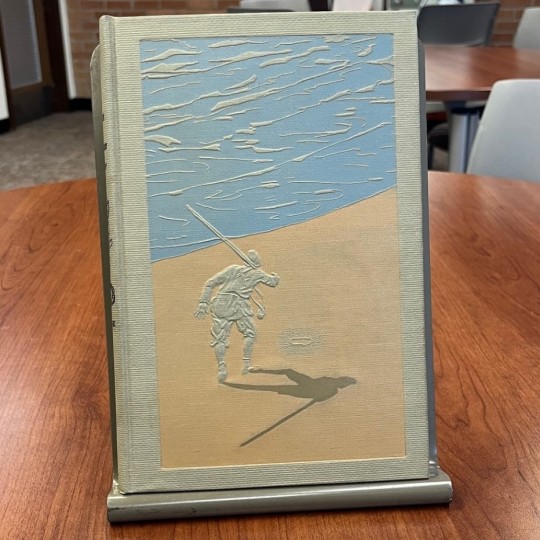
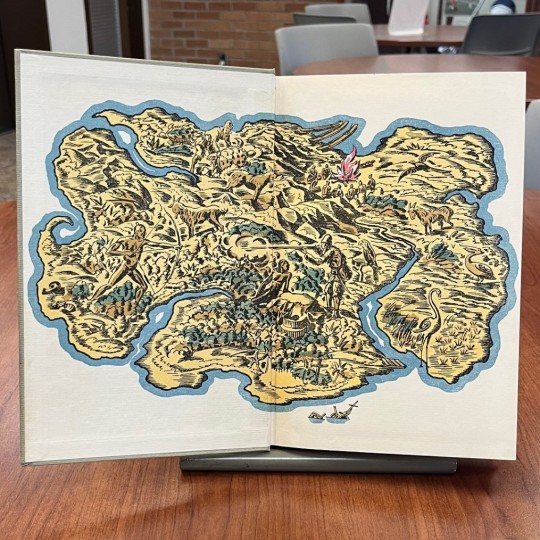
We're not sure why February 1 is Robinson Crusoe Day but it's a good excuse to show off this lovely circa 1930 Heritage Club edition. From the decorated title page, to the embossed cover, and the map on the end pages, this is a very attractive copy of the 1719 adventure novel.
The story of Robinson Crusoe's 28 years of survival after being stranded on an island was originally published with the main character credited as the author. As a result, many readers thought that is was a non-fiction account.
3 notes
·
View notes
Text
some of my favorite books are just like. I went to x city and spent this many dollars. then we went to y and then a little northwest to z and then spent this many cents and I'm like uh huh. exactly how many miles did you go and what did you spend. my brain is normal btw.
#this is catcher in the rye and on the road. like thanks guys. information :)#also stuff like robinson crusoe where he outlines exactly how he makes things. pleaseee walk me through it#books with days scheduled out.. ie little house on the prairie and like.. misc school age books
2 notes
·
View notes
Text

Thirty Inks in Thirty Days
September 2023
Day 16
Wearingeul “Robinson Crusoe”
——————
“Ask for Directions”
#ruth feiertag#fountain pens#thirty inks in thirty days#30 inks in 30 days#september 2023#day 16#Wearingeul#Robinson Crusoe#Ask for Directions#fountain pen inks
1 note
·
View note
Text
BETO: A beautiful day in the life of Robinson Crusoe
New Post has been published on https://www.aneddoticamagazine.com/beto-a-beautiful-day-in-the-life-of-robinson-crusoe/
BETO: A beautiful day in the life of Robinson Crusoe

0 notes
Text
Random OFMD S2 trailer thoughts:
Is no-nose guy Woodes Rogers? Are we getting Woodes Rogers?? (He's kind of the natural "semi-good historical pirate hunter that we can kind of cheer for but who is definitely also Stuffy and English" - he's also the guy who rescued the guy who inspired Robinson Crusoe, for what it's worth)
I have a feeling the "Hello, Edward!" we get and Ed's downtrodden expression isn't the first time Stede and Ed have reunited. If anything, it looks like there's going to be at least some period of Stede being the bad penny that keeps showing up in Ed's life to totally derail both his brooding and his manic attempts at "healing"
WE ARE OFFICIALLY DEPARTING FROM HISTORY, I REPEAT, WE ARE OFFICIALLY DEPARTING FROM THE HISTORICAL BLACKBEARD AND BONNET. Which is a huge relief for so, so many reasons but most of all because after they parted ways (ie, vaguely the end of S1) Bonnet and Blackbeard never saw each other alive again, despite the fact Bonnet chased after Blackbeard for days, for reasons that interpretations and theories range from personal revenge to.... yeah, actual love, platonic or otherwise.
So I am so, soooo happy to see we're jumping off from history and straight into, "This is a silly show about pirates in love only nominally connected to the historical Golden Age of Piracy in terms of the names of figures we borrow and reinvent, but the actual flow of their lives is only barely touched upon." Because it would break me if they stuck to Ed and Stede historically accurately never seeing each other again after "the breakup".
65 notes
·
View notes
Text
Deliberate Story Practice: Human vs Nature
Deliberate practice is a systematic approach to improvement. After conquering the initial learning curve, it's easy to plateau and stop developing. But when it comes to storytelling, there's always more to learn.
This week, I want to challenge you to spend at least an hour working on a short story based on the conflict between humans and nature.
Human vs Nature Explained
Conflict is the driving force of any story. It's the struggle your characters must overcome to reach the resolution. A typical story, even as short as a flash piece will contain several different types of conflict.
It comes in all sorts of shapes and sizes. From being embarrassed (human vs self), your phone dying at the wrong moment (human vs technology) to a full-on war (human vs human).
This week, we'll focus on another common type of conflict: human vs nature.
Nature is a powerful force in the world that affects us all every day. Our struggle against nature can range from inconvenience (rain on your way to work) to the extreme (a hurricane that wipes out an entire town).
Here are some examples of humans against nature:
a holiday ruined by bad weather
rabbits raiding the lettuce in your garden
an avalanche burying a snowboarder
a community struck by a terrible flood
a ship sailing through a massive storm
a post-apocalyptic scenario triggered by a meteorite impact
As you can see, you can write a novel based on human vs nature. Many successful stories use this type of conflict to drive the plot (Jaws, The Old Man and the Sea, Robinson Crusoe, The Day After Tomorrow).
The Challenge

For an hour or more this week, work on a story that includes humans struggling against nature. It doesn't have to be the only type of conflict in the story. For example, bad weather can lead to your characters fighting and breaking up during a holiday (human vs human).
When you start writing, you'll naturally layer various types of conflict. Your protagonist is struggling with something, and everything else around them seems to be going wrong. This is one way of adding progressive complications and building towards the crisis.
By writing this story, you'll be putting what you've learned into practice. You'll experiment with it and get a feel for how well it can work. You may even be inspired to include some human vs nature into your current or next WIP.
Practising is super important. All it takes is an hour.
Join this writing challenge
#writing#writers#write#writing challenge#writing sprint#word sprint#writeblr#writing analytics#deliberate practice#storytelling#amwriting
113 notes
·
View notes
Text
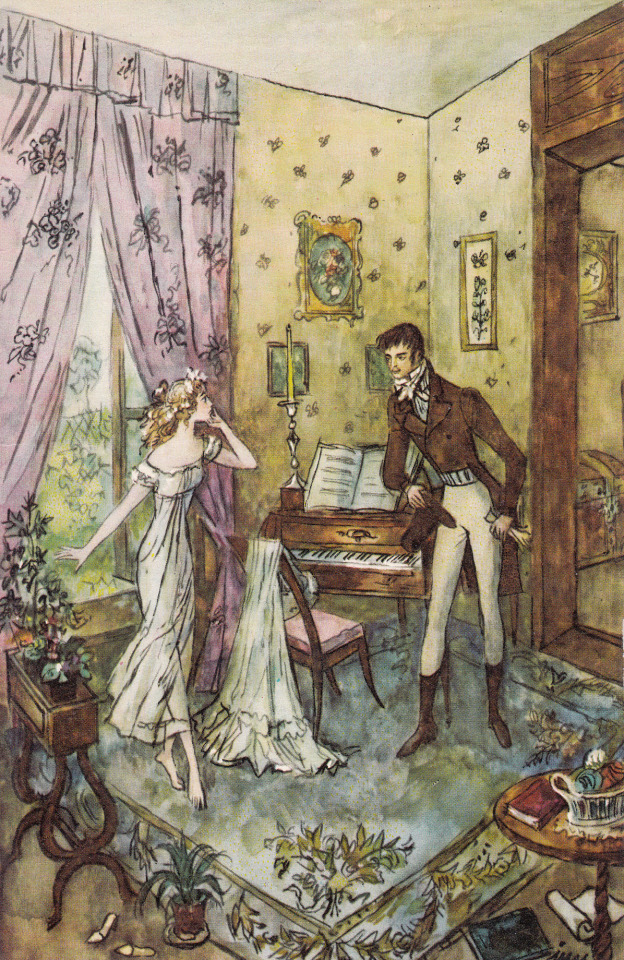
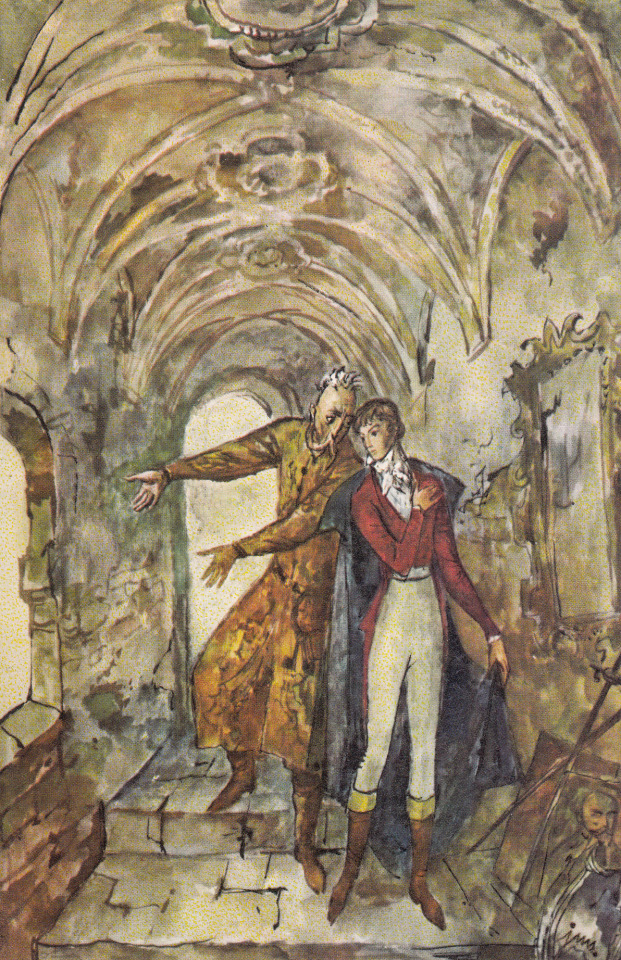
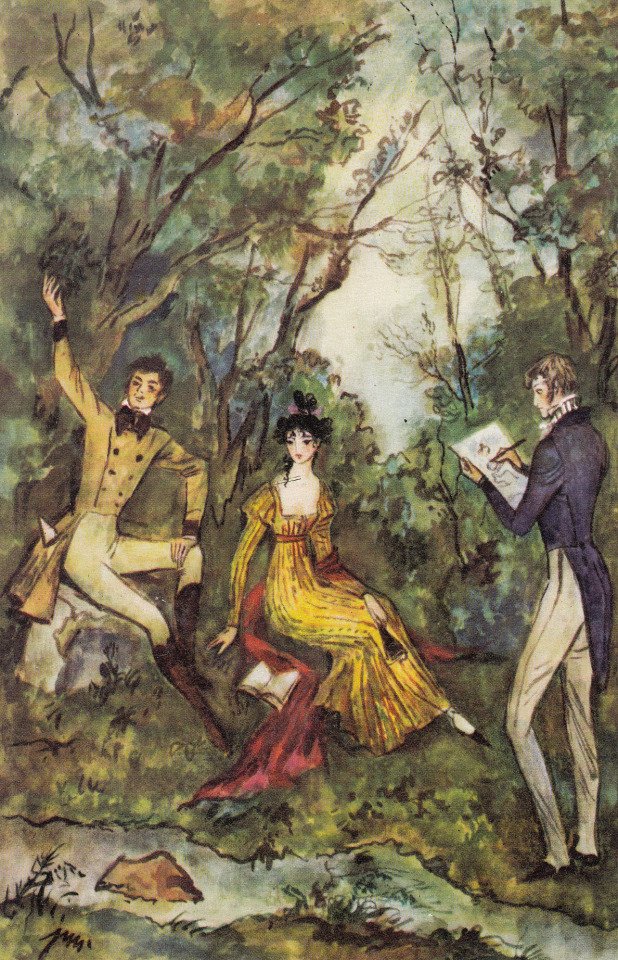
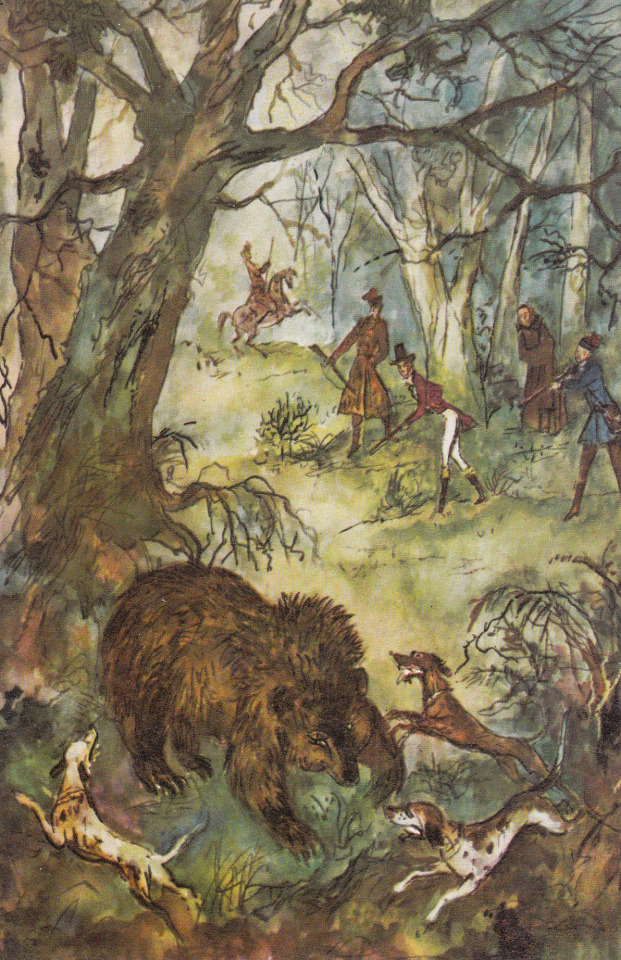
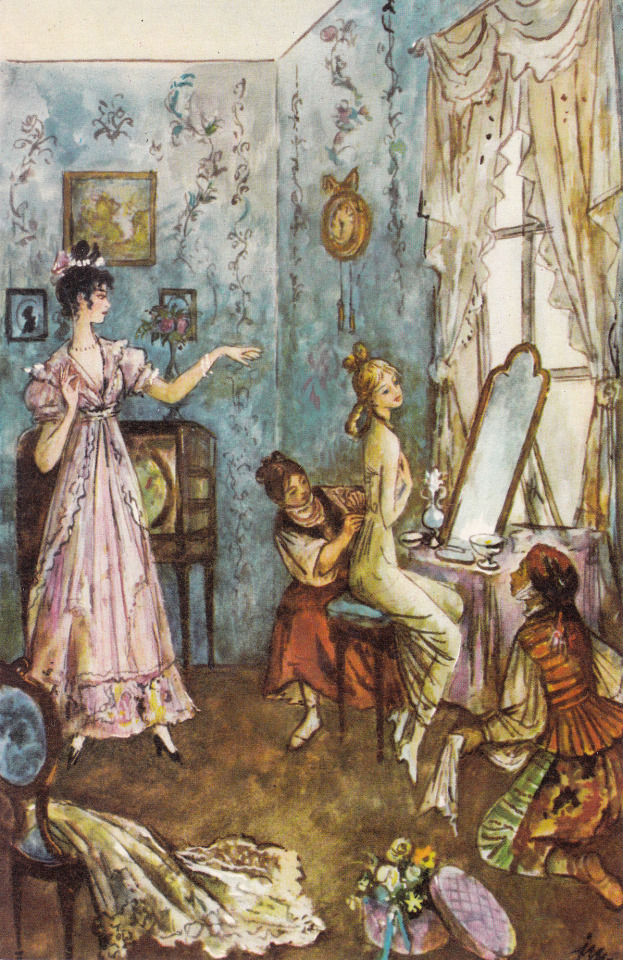

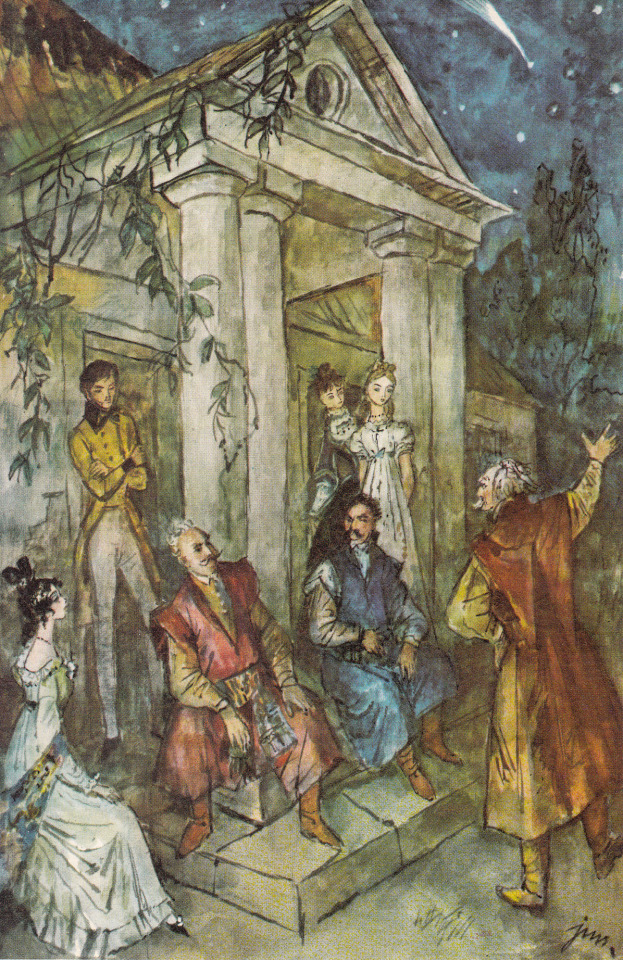
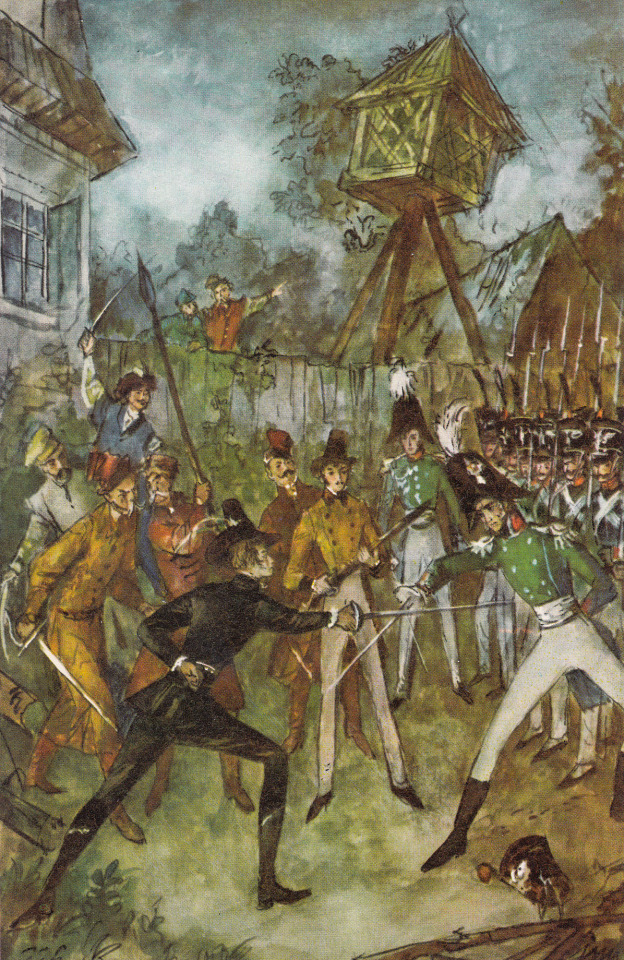
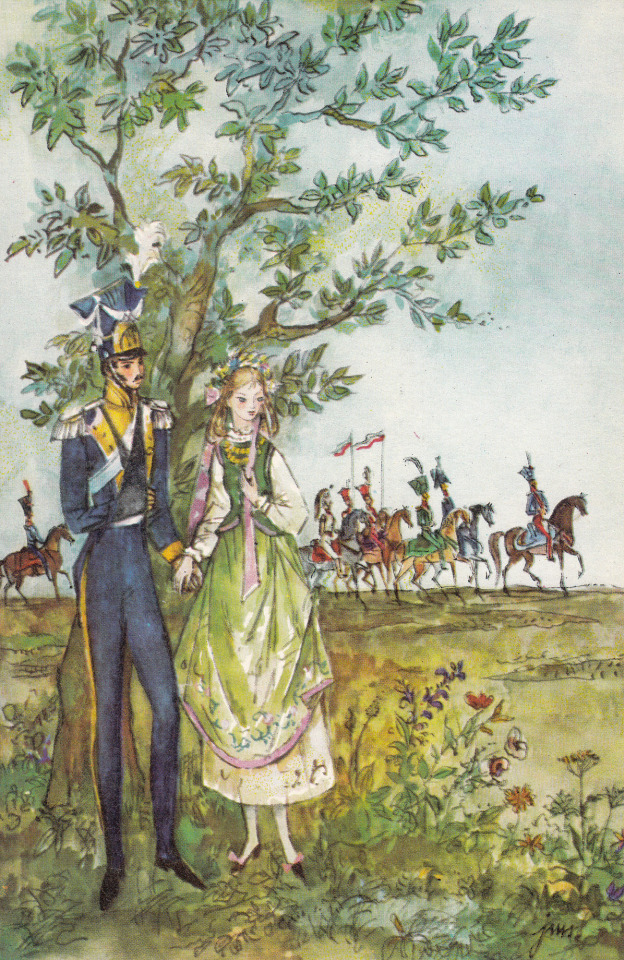
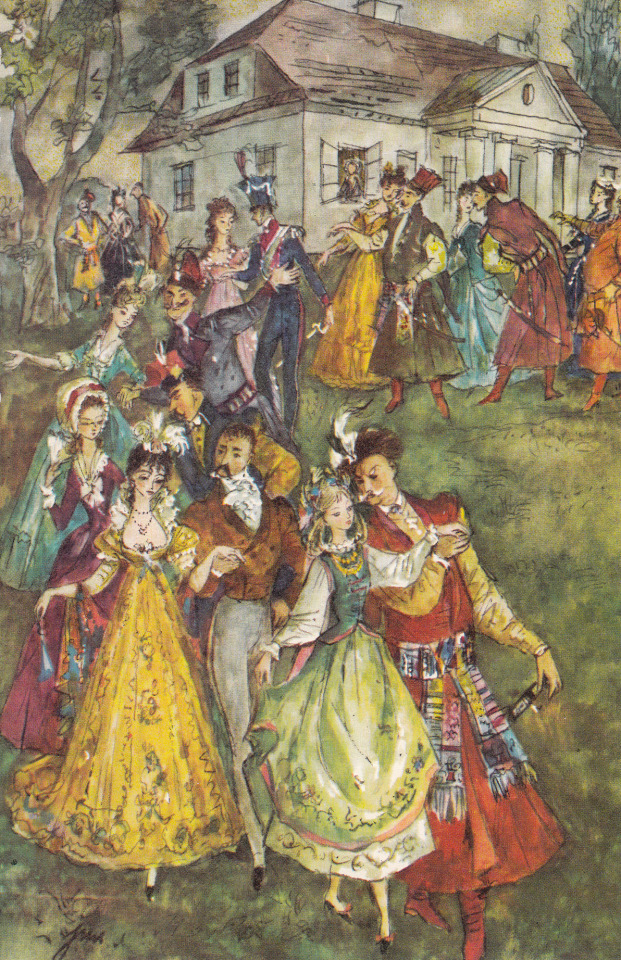
"Pan Thaddeus" illustrated by Jan Marcin Szancer (Polish, 1902-1973)
Pan Thaddeus (1834), by Polish writer, Adam Mickiewicz, is recognized as the national epic of Poland and it is considered by many to be the last great epic poem in European literature. The poem narrates the tale of two feuding noble families and the love story between Tadeusz and Zosia. It takes place in a fictional idyllic village, in 1811 and 1812.
"No European nation of our day has such an epic as Pan Thaddeus. In it Don Quixote has been fused with the Iliad. ... Pan Thaddeus is a true epic. No more can be said or need be said". (Zygmunt Krasiński)
"No play of Shakespeare, no long poem of Milton or Wordsworth or Tennyson, is so well known or so well beloved by the English people as is Pan Thaddeus by the Poles. To find a work equally well known one might turn to Defoe's prosaic tale of adventure, Robinson Crusoe; to find a work so beloved would be hardly possible". (George Rapall Noyes)
#pan tadeusz#adam mickiewicz#polish literature#jan marcin szancer#polish illustration#polish art#poland#polska#szlachta#nobility#poland lithuania#Polish lithuanian commonwealth#polish-lithuanian commonwealth#rzeczpospolita#kontusz#19th century#polish romanticism#polishcore#idyllic#dwór#romanticism#*
430 notes
·
View notes
Text
The Gloaming - Chapter 6 preview 🏰
Ch 6: Madame Beauchamp
Feeling at a loose end after supper that evening Jamie made his way to the library. As Joe had promised, the library at Wolverton Hall was indeed an extensive one and having finished re-reading his favourite book Robinson Crusoe, Jamie was looking for something new to discover. Access to reading materials at the workhouse had been quite limited (even more so at the blacksmith’s) and he relished being able to wander the shelves and choose from vast numbers of books on a myriad of different topics. He ran a finger along the leather-bound spines as he considered his options before pulling out Candide by Voltaire and began thumbing through.
“I didn’t know you spoke French, Mr Fraser?”
The tips of his ears pinking, Jamie whirled around to see Lady Randall standing not two feet away. If she was annoyed to find someone interrupting the solitude of her library she didn’t show it. In fact, she looked decidedly pleased to see him. Eyes sparkling in the lamplight, she motioned to the book in his hands with a smile.
“I confess my French isn’t much. I’ve been trying to teach myself but when one has to stop every fourth word to look it up its meaning in the dictionary I’m afraid it’s rather slow going”
Jamie was silent a moment, unused to this convivial tone from her. It was completely unexpected, but certainly not unwelcome.
“My father taught me, I think he’d planned for me to attend university in France one day”
“Your father was French?”
With a tone of of mock-outrage at the suggestion, Jamie explained that his father Brian had been Scots through-and-through but that he - like Jamie, was something of a polyglot. In addition to French and English, they also spoke Gàidhlig in his childhood home.
“Well I shall know who to come to next time I find a passage en français I can’t make heads nor tails of then”
She smiled again, revealing straight white teeth. As he took her in, Jamie swallowed, trying not to let his surprise show too much. Gone was the closed-off stance of their first meeting, replaced with a welcoming expression that he suddenly realised he’d been craving for weeks. Dare he push his luck and attempt to continue their conversation? Reasoning he might not get this chance again, he decided to press on.
Catch up on chapters 1-5 here
62 notes
·
View notes
Text
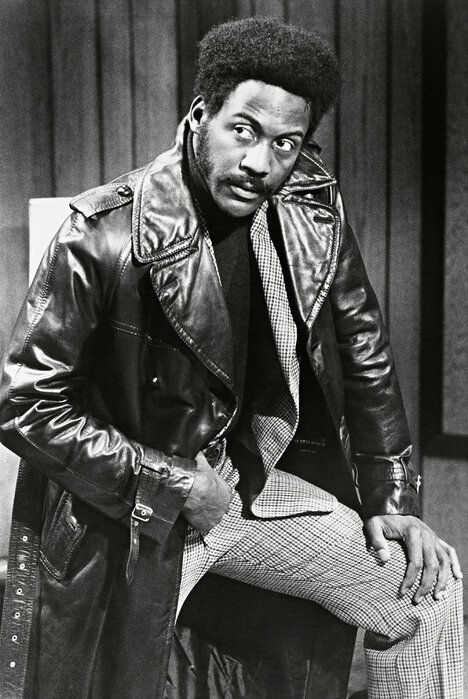
For the opening scene of Shaft – the 1971 film that helped inaugurate the “blaxploitation” genre and spawned an Oscar-winning song in Isaac Hayes’s call-and-response classic Theme from Shaft – the director Gordon Parks mapped out to the actor Richard Roundtree exactly what would happen.
Roundtree – playing the New York detective John Shaft who “won’t cop out when there’s danger all about” as the song puts it – was to stride out of the subway near Times Square, tracked by assorted cameras positioned opposite him and at high angles. “I want you to walk across 42nd Street,” Parks said. “And I want you to own it.”
Own it he did. In his beige turtleneck and brown leather trench coat, Roundtree swaggers and weaves through the hubbub, looking bemused at a demonstration going on around him (which was nothing to do with the film itself but a real-life protest by the Gay Activists Alliance) and improvising the moment when he raises his middle finger at an impatient cabbie. “I did own it,” he reflected. “Much better than I could ever have imagined.”
It was the first major screen appearance for Roundtree, who has died aged 81 of pancreatic cancer, and the one that defined him for the rest of his life. He was cast after a meeting with Parks, a former photojournalist, who showed him a magazine advertisement and said: “We’re kind of looking for a guy who looks like this.” Serendipitously, it was an ad featuring Roundtree himself.
In optioning Ernest Tidyman’s 1970 novel, in which Shaft is hired to rescue a gangster’s kidnapped daughter, MGM had considered making the characters white. But Parks defended the novel’s vision, including its acute awareness of Black culture. He wanted audiences “to see the Black guy winning”.
That single-mindedness paid off, saving the troubled studio from bankruptcy. “Ghetto kids were coming downtown to see their hero, Shaft, and here was a Black man on the screen they didn’t have to be ashamed of,” the director said in 1972. “We need movies about the history of our people, yes, but we need heroic fantasies about our people, too. We all need a little James Bond now and then.”
John Shaft was suave and uncompromising, free to dispense justice his own way, and cut from a snazzier cloth than the nobler roles for which African-American stars such as Sidney Poitier were known. In 2000, the critic Elvis Mitchell noted that Roundtree’s “on-screen relish, which was itself a kind of dynamism, connected to an audience hunger. And he held the screen like an aristocrat.” Mitchell compared him to Sean Connery, identifying “the same outsize wellspring of charm and virility, but with a leavening … sense of self-deprecation”.
He did many of his own stunts. “We could get close with our helicopter shots because you could see it really was Roundtree and not a stunt driver,” said Parks. “We spent 12 days on that chase, and wrecked four cars, two boats and a mock-up chopper.”
The actor returned for two sequels, Shaft’s Big Score! (1972), which was also directed by Parks, and Shaft in Africa (1973), which, regrettably, was not. After a brief Shaft TV series in the same year, which Roundtree described as “an ugly point in my long, illustrious career”, he was done with John Shaft. For now.
Born in New Rochelle, New York, to Kathryn (nee Watkins), a cook and housekeeper, and John Roundtree, a refuse collector and later church minister, Richard attended New Rochelle high school and won a football scholarship to Southern Illinois University. After working at Barneys department store, he modelled clothes and became one of the stars of the Ebony Fashion Fair, a touring spin-off of Ebony magazine. He then joined the Negro Ensemble Company in New York City and starred in its 1967 production of The Great White Hope.
Capitalising on the heat from Shaft, he joined Charlton Heston and Ava Gardner in the disaster movie Earthquake (1974), played the title character in Man Friday (1975) opposite Peter O’Toole as Robinson Crusoe, and appeared as a rakish carriage driver in the slavery-era TV drama Roots (1977).
In between TV series, including most recently Family Reunion on Netflix, he was in the action comedy City Heat (1984), set during the Depression and starring Clint Eastwood and Burt Reynolds, the gruesome serial-killer hit Seven (1995) alongside Brad Pitt and Morgan Freeman, the Disney comedy George of the Jungle (1997) and Rian Johnson’s witty neo-noir thriller Brick (2005).
Having declined various Shaft-related offers, he finally relented and appeared in John Singleton’s reboot, Shaft (2000), with Samuel L Jackson as his nephew. He returned for a misguided comic riff on the franchise, also called Shaft (2019), which revealed that Jackson’s character was in fact his son, and brought in a new generation in the form of a sensitive, gun-hating grandson.
“Everybody wanted to be you for a very long time,” Jackson told Roundtree in a 2019 interview with the Los Angeles Times. “You defined what cool was – you had the look, the walk, the attitude.”
Pigeonholed by the part in the 1970s, Roundtree finally made peace with it. “Sometimes it’s much easier to ride the horse in the direction that it’s going,” he said.
He was married and divorced twice, to Mary Jane Grant, then Karen Ciernia. He is survived by two daughters, Kelli and Nicole, from his first marriage, and two daughters, Tayler and Morgan, and a son, John, from his second.
🔔 Richard Arnold Roundtree, actor, born 9 July 1942; died 24 October 2023
Daily inspiration. Discover more photos at Just for Books…?
10 notes
·
View notes
Note
I'd really love the sci fi reading list, if it's not too difficult! Thank you for your explanation
Yes! Okay, requisite this is Not Authoritative Or Comprehensive claim, I'm a dork with a Russian degree, but here we go:
(I tried to organize this chronologically because if I did it thematically we would be here all day. Also, I still have more books, but they get increasingly niche. This is a Greatest Hits playlist, and if you look these people up, you will find their contemporaries)
(Long list below the Read More)
Jules Verne — 80,000 Leagues Under the Sea, Journey to the Center of the Earth. Excellent continuations of that exploration/'ostracized' genius figure, so popular in the previous century. French, so English translations. Kinda marks the transition point between 19th c. pure spec exploration and what we would call sci-fi. BUT BEFORE HIM...
Mary Shelley — Frankenstein is probably the first sci-fi novel as we know it. BUT BEFORE HER...
Margaret Cavendish — Okay, the 'first sci-fi novel' is hard to define for obvious reasons, but The Blazing World has as good a claim as any. Published in the 17th c., so it really traverses the genres, but includes a utopian kingdom accessible via the North Pole. Her husband was so impressed that he composed a sonnet for her, which serves as the epigraph for the novel; it's a wild read in the same way Robinson Crusoe and other early novels are, and I'm mostly including it here because it's so, so wild to read in 2023.
John W. Campbell — That dude. The hero's journey guy. His short story Who Goes There? Has been adapted a million times into a little movie called The Thing. Unfortunately got really into race science, so Isaac Asimov told him to fuck off. Edited the magazine Astounding Science Fiction, which in 1939 published Black Destroyer by Alfred Van Vogt, usually cited as the beginning of Golden Age sci-fi.
H. G. Wells — Big critic of class divisions in Victorian English society, coined the term 'time machine' as we think of it in his novel...The Time Machine. A lot of what we consider 'classic' time travel tropes were, if not invented here, had their seeds planted here. Also famous for War of the Worlds, leading to a MINOR disturbance when Orson Welles did a dramatic radio reading.
Edgar Rice Burroughs — the man, the myth, the legend. If I could persuade you to read one white English sci-fi author with rather dubious politics, it would be him, if only because of how influential he was. Mostly famous for Tarzan, but he also wrote a whole series about Hollow Earth that crosses over with Tarzan at some point (Pellucidar), as well as the series Barsoom (A Princess of Mars and its sequels), and Amtor (Guy named Carson Napier gets transported to Venus, which was a watery hellscape, as was popularly theorized for a while).
They're basically pulp comics before pulp comics, published in magazines, extremely lurid and dramatic, and he did write his own crossovers. These were what the first modern superhero comics writers often grew up reading and what inspired them—John Carter's cultural cachet was borrowed by Superman until it became his cultural cachet.
They're very fun, but also supremely products of their time, and extremely fond of the British Empire.
Judith Merrill — prolific writer and editor, who also wrote one of my personal favorite reactions to the atomic bomb in Shadow on the Hearth.
Gabriel García Márquez — we're gonna take half a sidestep into magical realism here (which is, to define quickly, a genre incorporating the fantastic into otherwise realistic narratives, often formed and associated with decolonial and post colonial Latin American fiction, but not always. It's a fuzzy genre). He wrote in Spanish, but I read him in English. One Hundred Years of Solitude is probably one of the great novels ever written. My mother is also telling me to rec Love in the Time of Cholera and she wrote about the man, so listen to her.
Jorge Amado — the sixties were the big magical realism heyday. Amado was Brazilian and his Dona Flor and her Two Husbands is a book my Spanish high school teacher made me swear to read some day.
Andre Alice Norton — Deserves a spot for being one of the most prolific sci-fi authors of all time during a time when sci-fi was INCREDIBLY inhospitable to women. Over 300 books!
Robert Heinlein — This man is the poster child for "male author who writes groundbreaking sci-fi novels but cannot be normal about women with a gun to his head". The Moon Is A Harsh Mistress is excellent and incredibly important for how comprehensive the creation of Luna and its workers was, even if it is very sixties free love. Also wrote Starship Troopers, the novel.
Edward Smith — you haven't seen drama until you read what they said when Lensman (first book is Triplanetary) lost to Foundation for the Hugo in the sixties.
Larry Niven — Fleet of Worlds! Ringworld won a whole host of awards and deservedly so in 1970. Fair warning, his stuff decidedly falls under "hard" sci-fi (lots and lots of discussion for plausible alien artifacts), though it is awesome just in terms of how he can communicate scale. If you see a big ring-like structure in space, you can thank this guy, basically (the term ringworld comes from here). Also did a bunch of co-writing. I haven't read his other stuff, but CoDominium is on my list (he co-wrote it. First book is The Mote in God's Eye). If you liked the TV show The Expanse when it did the alien stuff and the later books it never got to adapt, you'll love this guy.
Samuel R. Delaney — Dhalgren is a book I am forbidding you to research before reading. Go in prepared. You have been warned. You will either love this book or set it on fire.
Stanislaw Lem — Solaris. I started this novel last week after watching the Tarkovsky film and. It's doing something to my brain, that's for sure. It's a book where I have to read every sentence twice. If you read it, find a good translation if you don't speak Polish. The author famously is very mad at critics who use Freudian analysis for it, so tread carefully (it's about the limits of rationality and our ability to understand, so. Fair).
Joanna Russ — The Female Man is a seminal work of feminist sci-fi. It's—fascinating, to be honest. Discusses socially enforced dependence of women on men and the creation of a different gender, a "female man", when the protagonist chooses to reject it and thus her socially enforced gender. I wouldn't call it a transgender manifesto (written in 1975, features insufficiently masculine men undergoing sex change surgery, so...yeah) but it definitely awoke something in my brain when I was 16 lol. I would LOVE to see it revisited in literary criticism from a modern perspective, especially from trans people.
C.J. Cherryh — If we talked about female sci-fi authors from the 1950s-70s writing under gender ambiguous aliases, we would be here all day, so I'm picking the one whose books I got for cheap at a book sale. Her Foreigner series has such a good premise with descendants of a lost Earth ship and interstellar court drama, and it's SO fun.
Poul Anderson — the name is not a typo, do not look up Paul Anderson, you will never find him. I actually have a copy of Three Swords and Three Lions currently collecting dust on my shelf and judging me right now as I wait to read it. Tau Zero is one of the greatest things I've ever read. The time dilation stuff gets kinda dense at times, but he incorporates some interest in his Swedish history and folk tales into it, and his explanation of travel at the speed of light and incorporating that into his discussion of nationalism is incredible. The ending where they survived [REDACTED] and landed on what may have been [REDACTED] has been bouncing around my brain for a bit now.
Laura Esquivel — Like Water for Chocolate is from the magical realism reading list.
Salman Rushdie — Midnight's Children is one of those bucket list books, for better or worse. Recontextualized Indian independence from the British and the Partition through framing of a husband telling the story to his wife, as he actively tells the story to her. Really uses the fantastical versus the real w/history versus truth so well.
Nancy Farmer — The Ear, the Eye, and the Arm, for the kids lying about their age on Tumblr dot hell. Three kids try to escape a kidnapping after sneaking out—in 23rd century Zimbabwe. With the help of three mutant detectives. It rules.
Ben Okri — Okay, I have not read his stuff yet, but it is on my list. Other people here have discussed his influence on them in post colonial sci-fi. His big one is The Famished Road, first in a trilogy, and renowned for its discussion of the spiritual and realist world coexisting in African animist spiritual life.
Nnedi Okorafor — I have read one of her short stories, Remote Control, and currently have an book list with her other stuff on it. Other people I know vouched for her work. She specifically writes Africanfuturism and Africanjujuism centered around her Nigerian background, and follows on from the likes of Okri and Octavia Butler. I'd also add if you're a Stephen King fan when he's in Dark Tower mode, she's probably gonna have things that appeal to you.
Mentions that are absolutely influential but don't need explaining on this website: Franz Kafka, Ursula K Le Guin, Douglas Adams, N. K. Jemisin, Ray Bradbury, Arthur C Clarke, Isaac Asimov, Frank Herbert, Alduous Huxley, Philip K. Dick, Orson Scott Card, Kurt Vonnegut, George Orwell, Octavia Butler, Neil Gaiman, Toni Morrison.
(to be clear: you SHOULD read them, but you probably know who most of them are and/or why they're big deals. Most of them are also incredibly prolific, and explaining their bodies of work are other posts. Trying to make a list about other folks)
For more on Afrofuturism,(not to be confused with Africanfuturism), I recommend the shit out of Afrofuturism: The World of Black Sci-Fi and Fantasy Culture, full of short stories and guides to art and music. I, alas, lack similarly useful authoritative guides to other genres, but I have read that one, so wanna toss it out there. There's so much.
10 notes
·
View notes
Text
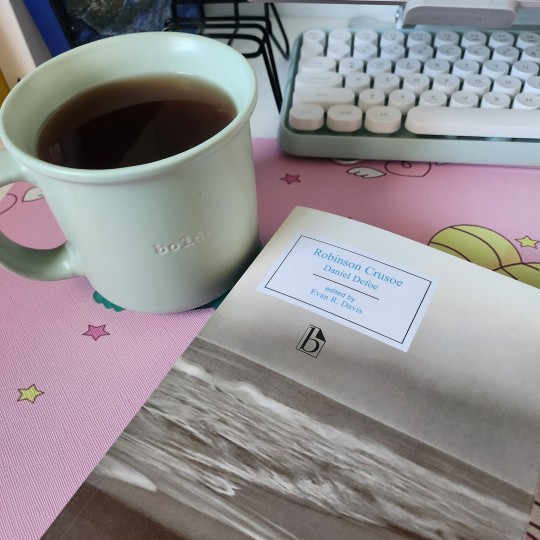

☕ Sept 21, 2023
my only in-person class today got cancelled, so I got to have a nice chill study day at home :)
tasks completed:
-psychology quiz
-watch stats pre class videos
-complete survey for research participation
still to do:
-read Robinson Crusoe
-download program for stats labs
unfortunately I've been dealing with a headache all day, so hopefully I can still get some reading done after dinner
16 notes
·
View notes
Text

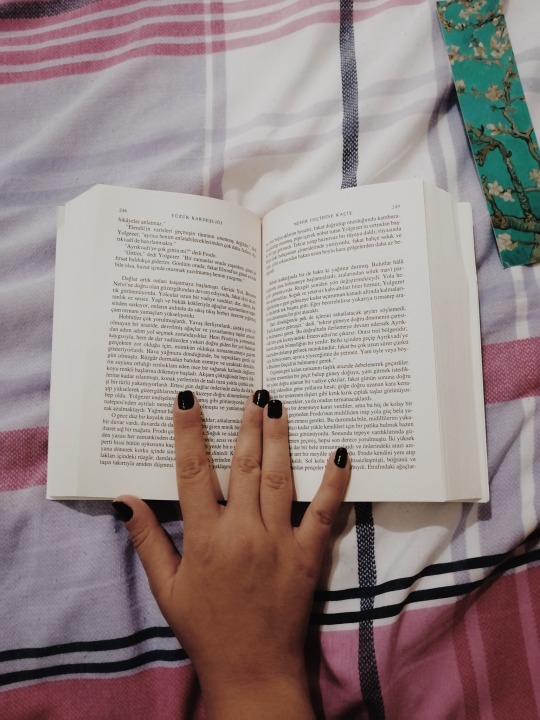
day 6 of my reading challenge:
6. who is/are the book character/s you dislike? and why?
severus snape. he is just a child abuser for me. the darkling, i don’t get the hype about him. he is just a murderer with very poor motives. from time to time i think about raskolnikov and how much i want to slap him. i kinda dislike heathcliff too. and oh my god i hate robinson crusoe. i’d like to kick his balls if i’m being honest.
after all these hate confessions, i'd like to share what i call “reading corner” in my room with you. isn't it so cute ಥ‿ಥ and my four year old niece bought that mug for me<3.
#readingwithlunlun#reading challenge#reading#reading aesthetic#reading books#book reading#new books#book quotes#books#book#book review#bookboost#booklover#bookaddict#bookaholic#bookblr#if i elaborate i won't shut up like ever#lunlunreads
85 notes
·
View notes
Text
okay but when i was 13 me and my neighbours took a week to dig a hole in my garden big enough so that we could all stand in it up to our waists so there’s absolutely no way robinson crusoe did all of that work in one day
#based auf echten geschichten jaja klar#theres people who take longer than a year to build a house like this stop lying to me#this is just the fantasy of a little child making a fort of of blankets istg
6 notes
·
View notes
Text
While obviously central to, say, Robinson Crusoe (1719), Moby-Dick (1851), or Treasure Island (1883), the sea also drives some powerful narrative turbines in Jane Eyre (1847), Great Expectations (1861), and Tess of the d’Urbervilles (1891). Elleke Boehmer’s remark that imperial representations were ‘curiously invisible and yet ubiquitous’ in Victorian literature could also be applied to the sea, the means of building and sustaining that imperial network. [...]
Increasingly, critics have begun to draw out the role of the sea in a number of texts we might think of as non-sea-literature. [...] After all, most canonical Gothic novels include at least one significant sea voyage, shipwreck, or ocean storm. Consider Robert Walton’s ice-bound ship in Frankenstein (1818), Dracula’s voyages to and from England, the wreck that casts the Spaniard on Melmoth’s shore [...].
---
By the twentieth century the Age of Sail had given way to steam power and iron ships (a transition which spiked in the 1880s and 90s), and the whaling industry was soon in sharp decline. Other changes followed, such as the way improved navigation and nutrition, along with steam and the building of the Panama and Suez canals, reduced both the danger and the frequency of voyages around Cape Horn and the Cape of Good Hope. [...]
This is a ghost ship for the twentieth century, a new danger generated by steam power, large metal ships, their accompanying speed, and increasingly busy shipping lanes. There was no directly equivalent discrepancy of size and power between sailing craft in the previous century, while these days, radar, radio and GPS navigation mitigate against (though certainly do not eliminate) the risks of leisure craft entering shipping lanes and the problems of fog. The Gothic trope of the ghost ship is no more timeless than any other ghost. Historically situated, it becomes legible not by separating but by blending Gothic expression with nautical reality [...].
Modern uses of the sea (including opportunities for warfare, scientific investigation, oil drilling, or industrialised fishing) affect the ocean as an imagined space. Increasing interest in the ocean as a space of exploration and strange sea-creatures, for example, coincided with the rise of popular cinema; films such as Jaws (1975), the numerous Godzilla films, The Abyss (1989) and Pacific Rim (2013) exploit the mystery and terror of animal or alien threats from the unknowable ocean deep. [...]
These examples take some by now familiar nautical Gothic themes (dangerous unknown regions and creatures, concealment, isolation, depths vs. surface, claustrophobia, disorientation) and relocate them in new contexts of leisure, science, technophilia, and global commerce. [...]
---
The mid-nineteenth century was when the open ocean became a destination as well as a conduit: ‘a workplace, a leisure area, a stage for adventure, and a natural environment’. Nonetheless, the twenty-first century moment makes it particularly urgent to recognise the history of the sea. Philip Steinberg points out that the ‘one sea’ we now know the oceans comprise is a relatively new idea [...].
In 2017, the familiarity of seeing the world’s oceans through aerial and satellite photography conveys a sense of the ocean as holistic, but also reifies it as non-human and timeless, rather than as socially constructed, vulnerable, and rapidly changing. Far from unchangeable, however, the ocean registers damaging effects of climate change, consumerism [...]. [A] ‘burgeoning sense of an environmental crisis of the ocean is emerging hand in hand with the dawning recognition that our everyday lives affect, and are influenced by, the ocean.’
---
All text above by: Emily Alder. “Through Oceans Darkly: Sea Literature and the Nautical Gothic.” Gothic Studies Volume 19 Issue 2. 2017. [Bold emphasis and some paragraph breaks/contractions added by me. Presented here for commentary, teaching, criticism purposes.]
36 notes
·
View notes
Text
Terrarium Lights, Pt. 2.7
End of part 2!
Last time on Terrarium Lights: the ghost got a bit of... self revelation. He also goes by Samuel now.
The weekend came and went. Gail went to church, enjoyed fellowship over a shared luncheon, and accosted Pastor Jeremiah for help in prayer. He listened to her story about Samuel gravely, and didn't speak a word of doubt—but his broad, dark forehead was creased, and his rich voice rang uncertain as he clarified that she wanted him to pray for the ghost of a college-age lad who had been living in her kitchen.
"I'll be sure to give you more context and information once I have it," Gail said, "but right now the both of us know precious little, and I want to talk to my husband once he gets back. The ghost is going by the name Samuel for the time being."
That didn't appear to settle any of his confusion. She asked for him to pray for her to have wisdom as well; having secured his promise on both accounts, she drifted off to help clean up the kitchen, chuckling a bit to herself. She promised herself she would not foster that mischievous attitude too far.
The ghost in question was doing both better and worse than before. Overall, he acted less disturbed by his lack of knowledge, but he frequently grew distraught and anxious over his position. The realization that he might well be dead had begun to settle in his mind, and it had not done so easily.
It had, at first. It made sense. Samuel had noticed that he was not in a state of normal living, at least—but the jump from that to not being alive at all, and having no idea who he was or had been because he no longer existed properly, was a bit farther than he was prepared for.
It hadn’t seemed real, or possible, or comprehensible. But it was his reality, so he had to comprehend it, somehow.
Gail tried to help as best she could; but, despite having had her share of existential drama in figuring out herself and her life’s path, none of that was quite the same as realizing you were a ghost. And this ghost in particular was far more prone to angst than she had been (or at least, than she could remember having been). Mostly all she could do was be there, talk to him, and go about her normal life in an attempt to provide some form of comfort, stability, as he alternated between calm and fluster.
Considering his proneness to angst and overthinking, Gail took to leaving books open on her dining room table, giving him the chance to put some new thoughts in his head besides the encroaching fear of the unknown mixing with what little he did know. A hymnbook, the Bible, Pilgrim's Progress, her book on insects, a few collections of poems by Ari Henderson, and a few of the novels they had—Robinson Crusoe, Sense and Sensibility, and Doctor of Grimfeld Hall—were rotated in stacks throughout the next few days. She wanted to put out something more specific, but she had no idea what kind of literary taste Samuel had. He didn't pay the books much attention, but he did flip through the hymnbook at one point, looking for "Rock of Ages."
Turning the pages him much more difficulty now than they had before, in the church.
The atmosphere in the house became something of a growing storm cloud. Something was going to give, had to give, but when, or how, or what remained a looming mystery, demanding unknown resolutions.
Later on, she left a pen and paper on the table, near the books—but he had trouble picking up the pen and maneuvering it properly. That Monday, after she had asked her pastor for prayer, he came to her for help in writing down what they knew so far; perhaps it would help him make sense of… something.
She obliged.
There wasn't much to put down.
To start the paper off with, there were the strange places he had mentioned before, the unknown presence of the friend that had been with him, the vague recollections of a place like Santa Juliana, and (at Gail's prompting) the fact that he was familiar with electrical workings to some extent. Gail was going to say "to a great extent," but she knew nothing of the matter, and as such could not helpfully gauge his knowledge. He, naturally, did not remember if he knew much or not.
After some back and forth and questioning, they also wrote down several aspects of his physical appearance—that his eyes changed shade and amount of color, and that to Gail's eyes his shoulder was torn and bore dried blood, while he could not notice it at all. Upon further observation, they found that Gail could see a decent amount of dried blood matted in his hair, below his ponytail, while he could neither feel it, nor see it (discovered once they managed to finagle the mirrors). They both seemed to agree on the state of his clothes, though: scuffed and dirty, but not in a terrible state.
They noted down that he could interact with real objects, but not affect them much. Gail could touch him, and he could feel it, faintly, and her sensation of him did not seem to be of a normal physicality. Samuel got hung up on the fact that she distinctly felt him as warm.
"That doesn't feel right, somehow," he said. "Maybe it isn't so, but I thought death was associated with cold?"
“I wouldn’t know,” Gail replied, shrugging. “I can’t say as I’d rightly know what the state of the dead is, myself.”
At least for now, he seemed to be in a steadier, more objective mood towards the idea of being dead.
"Hypothetically, I should know," he said wryly. "And yet…” He gestured to himself. “However, warmth could be possibility since I am a kind of… I guess… energy? Energy often produces warmth, so maybe that’s why."
"I can't say as I rightly know about that, either," Gail chuckled. "But I'll take your word for it."
After even further debate and discussion, they also discovered that his sight of the world more or less depended on how colored his eyes were. Times that Gail could remember them being colorless, he could remember as the world around him turning murky and only patches of indistinct light and shapes.
He muttered something about energy and color and light that Gail neither understood, nor write down.
But despite all that they wrote down, Samuel was not pleased.
"I guess… I don't know. It's all information, and that's good, but, well, I don't know what to do with it. What does it mean? I… I guess I thought it would help, but it hasn’t really done anything except occupy time."
"It’s at least a start." Gail set the pen down and surveyed the single page they'd filled. "Perhaps now that we're both paying attention, we may begin to see and understand something more from all this. I don't rightly know what, just yet, but it's more information than we started out with."
Samuel nodded, still frowning.
"I wonder if I could find where you lived, if you truly are from Santa Juliana," Gail said, tapping at the table. "Though we have precious little detail to go off of. The sort of thing as you’ve described in the past could be found in a hundred places in this city alone.”
Samuel hesitated. "Maybe we could go and visit the city? But I… I don't know if anyone else can see me. I suppose I could be rather… alarming, if I have blood on me."
"True. So far you've only interacted with me that you can remember, and we haven't tested out anything further. Though, as far as I know, I'm not special in the way as sees ghosts. Or at least, this would be the first I'd know of it."
Samuel considered this for a bit. "I suppose we may want to test my visibility somehow before going to town?" He bit his lip.
"Does the idea concern you?" Gail asked.
"I… I suppose it does. I don't know of any strong logical reasons as to why it would, but… the thought of it almost frightens me. Less just the idea of meeting someone new, and more the idea of going into town. I guess… there are a lot of unknowns. At least, that would be the best I can figure out. And, well, going and being seen would be bad, but going and not being seen would be just as bad somehow. For it to be further confirmed that I’m… not here.” He pulled at the hem of his waistcoat, and moved to fidget with the buttons of it. “But… I… I do think going to town is perhaps the best next step.""Perhaps," Gail said. He was having trouble standing in place, and his hands kept moving, fiddling with different parts of his outfit. "But we have time enough, I think. You've stayed here for a good while, so I don't feel you in danger of running your time out. If you were, I believe we would have noticed something to that effect before now. So we can wait and see, and test out if others can see you first, and then move forward from there. Decide whether we can just go about town, or else disguise you, or something of that nature."
Something tickled the corner of her mind about another plan they had made, to go somewhere, but it was refusing to take shape.
Samuel sighed. "But test it how?"
Gail tapped the side of her chin. "Well, my husband was delayed some in returning, but since the letter took a few days to get here, I suppose he might be almost back on schedule. We can wait for him to get back. If we need something sooner, or the delay is severe, I suppose we could ask Pastor Jeremiah to come over for some tea and cakes. And once that's done, I can take the terrarium in for Mrs. Oberson as a reason to go all the way into Santa Juliana. She lives rather on the outskirts, but we can make a detour or two. Perhaps even stop by the university—though I don't know if we could see my daughter on such short notice. But we can find another excuse."
"That… that sounds like a good idea," Samuel said. Worry still pinched at his eyebrows, but he made no attempts to alter the plan.
Instead, he began pacing. Gail went back to her chores, unsure of anything else she could do. It was once again time to dust the house from top to bottom, and so she started with the desk and moved most of what was on it to the dining room table.
The terrarium for Mrs. Oberson she left near the edge of the table, so she could see it easier, making a mental note to spray it with a bit of water after dusting.
It seemed like it was doing well, which was encouraging.
Samuel’s pacing ended with him in front of the table, looking over the terrarium.
"I was thinking," he said, leaning over it, "about the idea with the lights. I don't really know how well this would work, but if you had some kind of shade that focused it more outward? So that it wouldn't get the moss. But well, then it would end up more as a… a spotlight than a lamp. And that might be totally unnecessary if there are lights that help plants."
There was strain in his posture and voice—probably trying to distract himself, Gail decided.
"If it were more for spectacle than light," he continued, "you could probably use a very small light, mostly just to highlight colors and setting than actually illuminating things. Like… maybe inside of it, in the moss. Or maybe… pair it with some kind of colored glass, I don’t know. Or maybe if it’s just a problem of it drying out, you'd could water the moss more? Though you'd also have the problem of watering the moss and not activating the electricity. That could be as simple making sure the circuits are properly covered. Or maybe a light ringing around the opening or hanging above it instead of a light inside of it. That would be simpler. I don’t know why I was thinking of a light coming up out of the moss. Though that could maybe look interesting."
He picked up a large old lightbulb that Gail had kept, wondering if she or Michael could make a terrarium small and delicate enough to fit inside it. It was dusty with disuse and its years being spent waiting for another day. Holding it was a struggle for him, light as it was, but he managed. He examined it, noted that it was broken, set it down again.
Gail wasn't quite sure what he could do or what he was even trying to do—he’d never actually interacted with her electric system before, much less the lights specifically, and he seemed even more scattered than usual—but she paused in her dusting to get him a new one. It could do him good to mess around with something new.
He barely noticed—lost in thought, muttering to himself, with a focused and tired look about his eyes—but nodded thanks when she passed him on her way back to the desk.
Samuel gave a strangled yelp.
Gail whirled, to see the lightbulb fizzling on in his hand. He dropped it, flailed to catch it, missed.
"I… I'm so sorry," he gasped, "I didn't mean—”
He froze, eyes wide, the broken lightbulb rolling at his feet.
"It's alright," Gail said soothingly, "it was an accident. No harm done."
The color was seeping out of his eyes—the lightbulb sparked and fizzed.
Gail took a step towards him, to reassure him, to move past and grab the broom by the kitchen door.
Samuel jumped backwards at the movement, flailing again—his arm hit the edge of the terrarium with more force than either of them dreamed he was capable of. The terrarium spun, slid off the table, and crunched to the floor with a spray of broken glass and wet soil.
"Oh no," Samuel wailed—and vanished.
#oh no~~#what's he gonna do#inklings challenge#inklingschallenge#inklings challenge 2023#team lewis#genre: portal fantasy#theme: burial#theme: visiting the sick#story: finished#gail goffrey#samuel the ghost#ocs#writerblr#salt and light#terrarium lights#the santa juliana files#original story#original fiction#scribe writes#scribe does inklings
3 notes
·
View notes
Text
Thanks to Doraemon’s interference, Nobita and Shizuka end up married in the future. As children, Nobita’s crush on Shizuka is obvious, and there can be no question that Shizuka sees him as a close friend. She genuinely enjoys his company, goes above and beyond to help him when he is in trouble, and would be very upset if he had to move away. But does she ever consider him in a romantic light?

In the present day, Shizuka has not committed to the idea of marrying anyone specific yet. When Nobita uses the "Dream Recorder" (ユメコーダー) to find out who her ideal partner would be, her future partner is shown with a blank face. Her dream partner does say, however, that while they are lacking in accomplishments and riches, they love her more than anyone.
Source: ユメコーダー, 1974 (manga)


So how does Nobita stack up against Shizuka’s dream partner? There are many times when Shizuka seems unimpressed with him. When Nobita sends a pumpkin carriage to bring her over for a party, she is disappointed to see that he’s the one behind it.
Source: だいこんダンスパーティー, 1979 (manga)

She is disappointed again when he gives her a poster as a present, only to find it’s a poster of him. He wanted to give her a poster of a fancy car sealed inside "Easy Carrier Paper" (かるがる持ち運び用紙), but when the driver drove away, Nobita put himself in the poster in desperation.
Source: ポスターになったのび太, 1981 (manga)

Nobita uses the “Talent Selection Board” (いいとこ選択肢ボード) to improve his looks, but Shizuka doesn’t believe it’s him, saying that Nobita is much “funnier looking”.
Source: 顔か力かIQか, 1988 (manga)

After Nobita strands the two of them on a deserted island with the "Robinson Crusoe Set" (ロビンソンクルーソーセット), he tries to calm Shizuka by telling her that he’s there. She retorts that that’s the reason she’s worried!
Source: ロビンソンクルーソーセット, 1983 (manga)
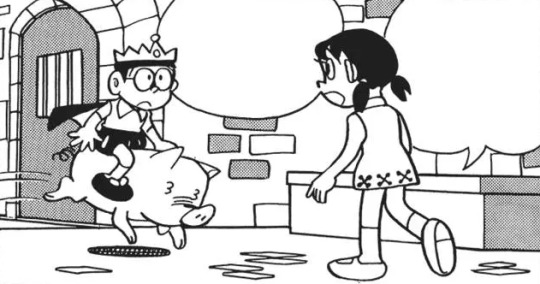
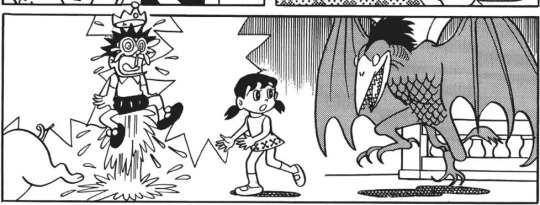
When Nobita has appeared in Shizuka’s dreams, it’s sometimes a very unflattering image.
Source: ゆめのチャンネル, 1977 (manga)

However, that is not always the case. When Shizuka is cast in the role of a princess in a shared dream using the "Indulgent Dream Kit" (気ままに夢見る機とアクセサリーセット), she is resistant to the idea of an arranged marriage and sneaks away from the palace, disguised as a male knight. But after adventuring with "Nobitania" (who, unknown to her, is played by the real Nobita), she admits that if he was her arranged partner, she would be happy to marry him.
Source: Nobita’s Three Visionary Swordsmen, 1994 (manga, Doraemon Long Stories)
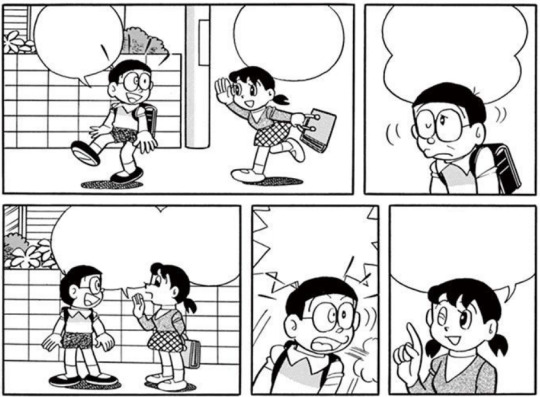
When Shizuka tells Nobita about her dream the next morning, she’s not willing to say too much, but she does reveal that his dream counterpart was “very cool”.

Under the influence of the "Dramatic Gas" (ドラマチックガス), Nobita confesses his love to Shizuka and she shyly replies that she loves him, too. Although this should not be read literally due to the gadget’s effect, the "Dramatic Gas" seems to work by exaggerating existing emotions instead of making them up.
Source: もりあがれ!ドラマチックガス, 1984 (manga)
Shizuka is also known to get jealous when Nobita is attracted to other girls.
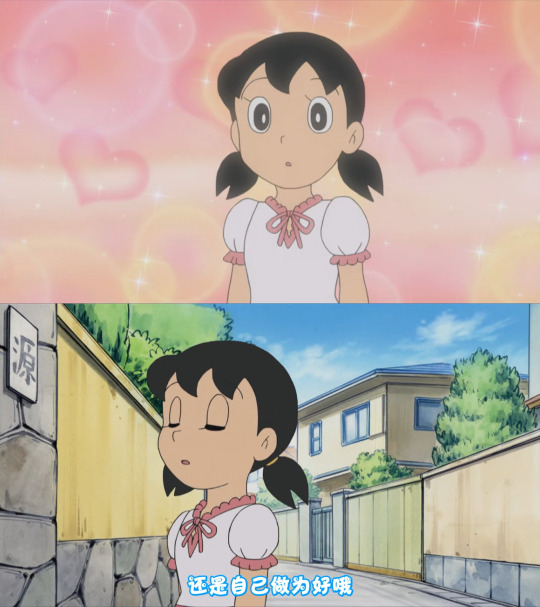
The anime contains more hints that Shizuka may harbor romantic feelings for Nobita. When Nobita uses the “Popularity Pheromone” (モテモテール) to make himself irresistibly attractive to women, Shizuka is affected, but continues to act normally around him and refuses to let him copy her homework. One interpretation for why her behavior does not change might be that she is already attracted to him.
Source: モテモテール大作戦, 2011 (episode from 2005 anime)

Heart symbols are seen rising from her after Nobita saves her from a blizzard.
Source: はこ庭スキー場, 1979 (episode from 1979 anime)
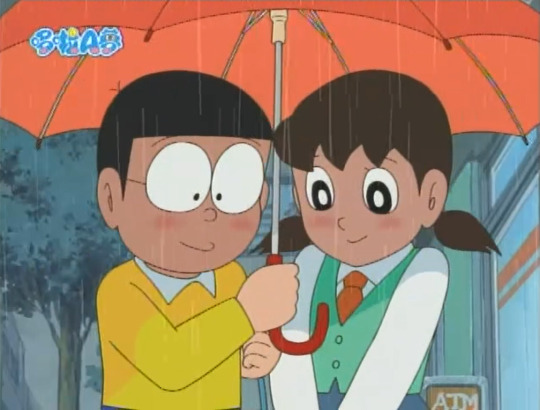
Both Nobita and Shizuka blush when they share an umbrella.
Source: ラッキーカラー棒, 2004 (episode from 1979 anime)

When Nobita enters her dreams and defeats a monster giving her nightmares, Shizuka (not knowing it’s the real him) is so grateful she wants to marry him.
Source: 夢ボート, 2000 (episode from 1979 anime)
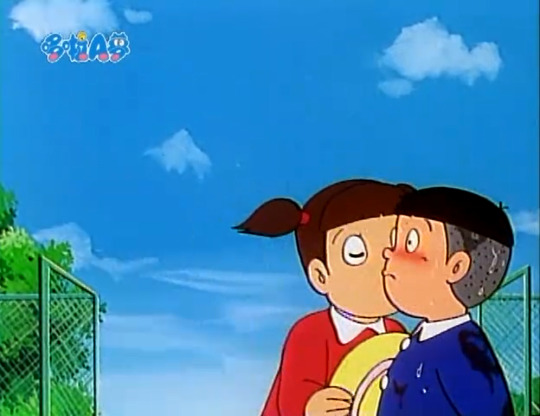
When they first meet in kindergarten, Shizuka gives Nobita a kiss after he retrieves her hat, which Gian had dropped in a swimming pool.
Source: 小さな恋にメロメロ, 1993 (episode from 1979 anime)

In the present, Shizuka has kissed Nobita on two occasions. Once is after he spent all day looking for a pin she lost, and fixed it after he accidentally broke it.
Source: さがし手, 1999 (episode from 1979 anime)

Another time is when Nobita used the “Mosquito Needle” (蚊チューシャ) to get rid of her anxiety over a violin exam.
Source: 蚊チューシャ, 1999 (episode from 1979 anime)
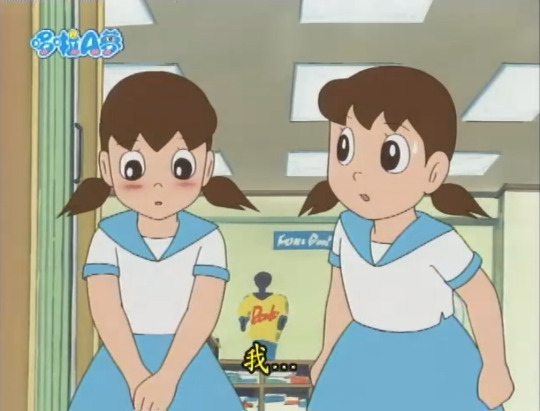
To tell the real Shizuka apart from a clone made by the “Clone Mirage” (分身蜃気楼), Nobita asks if Shizuka likes him. The clone is offended by the thought, but the real Shizuka blushes and refuses to answer. When Nobita asks for clarification later, Shizuka replies that her answer is "secret".
Source: 二人のしずかちゃん, 2004 (episode from 1979 anime)
27 notes
·
View notes